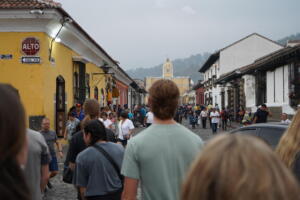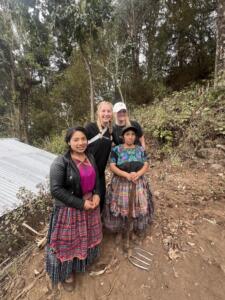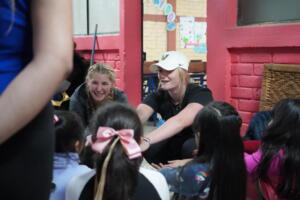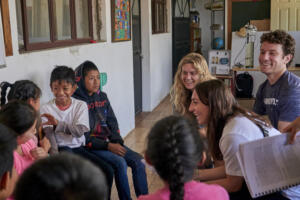Guatemalan Life Lessons
by Graham HaysFor 16 Vanderbilt student-athletes, the Ingram Center’s Guatemala service trip opened eyes to global issues of social impact, sustainability and healthcare
NASHVILLE, Tenn. — People bring back many things from a week of travel: souvenirs, sunburn, some good stories to tell. For student-athletes fresh off another year balancing world-class academics and SEC athletics, there would be nothing wrong with looking forward to little more out of a trip than lazy days by the pool or old-school sightseeing.
But for 16 Vanderbilt student-athletes, a weeklong immersion trip to Guatemala in May wasn’t about unwinding at the end of the year. Far from familiar campus paths they followed to class or practice, they walked with locals on daily treks to the farm fields that sustained communities. They spoke with schoolchildren and watched medical professionals and volunteers fight malnutrition in a low-resource community. While they returned with photos and stories (and a few sunburns), the perspective they gained will last longest of all.
“I know that in my life, in whatever kind of career path I choose or wherever I end up, this is something that really brings me joy,” swimmer Jenna Ravarino said of the experience. “I want to make sure that I continue to do this throughout my life, taking that extra second to step away from my world and experience and give back to other people. That’s something that changed my perspective on a lot of things and instilled a different level of gratitude that I didn’t realize I could have.”

Ingram Center in Action
The trip was organized through collaboration between the Ingram Center for Student-Athlete Success and Avery Dickins de Giron, executive director of the Center for Latin American Studies, and Mario Avila of the Owen Graduate School of Management. Working with the Office of Immersion, the Ingram Center ensured that students could apply the week toward their immersion requirement if they wanted. Student-athletes from six teams and a variety of classes and majors participated, with all travel costs covered, and they chose among itineraries that offered either a social impact and sustainability or health care focus. The travel party also included three faculty members and four staff members from Athletics and Housing, with the Ingram Center’s Katelen Watkins, assistant director for student-athlete development, quarterbacking the planning and execution.
The social impact track worked closely with Soles4Souls, a Nashville-based nonprofit and longtime community partner that distributes shoes and clothes to those in need around the world. Student-athletes also had the opportunity to learn from and work with Hiba Baroud, assistant professor in the Department of Civil and Environmental Engineering and the Littlejohn Dean’s Faculty Fellow, on several sustainability projects.
Partnering with Shelza Rivas, assistant professor of nursing and director of global partnerships for the Vanderbilt School of Nursing, and Manola McCain, assistant professor of nursing, student-athletes on the health care track spent the week immersed in the communities of Guatemala’s western highlands. They worked closely with Primeros Pasos, a Vanderbilt-affiliated not-for-profit primary care clinic with special emphasis on nutrition and health care for children and mothers, while also learning about the needs of the greater community.
View this post on Instagram
Seizing the Opportunity
Newly arrived from Furman as a second semester graduate transfer, football student-athlete Julian Ashby was still learning his way around Nashville when he first read the email from the Ingram Center about summer travel possibilities. A physics graduate and three-year starting long snapper at Furman, Ashby chose Vanderbilt because it offered some of everything—the opportunity to play SEC football this fall while taking the next step academically through the master’s program in mechanical engineering. A trip to Guatemala, even if not a typical part of the offseason routine, felt like more of Vanderbilt being Vanderbilt.
“My thought process was I’ve only got one year to play football here, so I just really wanted to take advantage of any kind of cool opportunities offered,” Ashby said.
For many student-athletes, the handful of weeks between the end of the spring semester and the start of preseason or fall workouts are one of the only times when it’s feasible to immerse themselves in something beyond their two-pronged campus routine.
In fact, some participants were still pulling double duty while on the trip. A three-time All-American who helped Vanderbilt win a national championship in 2023, bowler Paige Peters heard about Guatemala from teammates who went on previous trips. She wanted to experience it herself, even if that meant that when others rose before dawn to fit in an extra workout, she got up to study and complete homework for two chemistry classes and then wrestled intermittent Wi-Fi as buses bounced across rural roads.
“During the school year, it definitely would have been a lot more difficult,” Peters said. “I’m glad it was right at the end, and I’m only taking two classes.”
After meeting on campus in the predawn hours of May 11, the travel party flew from Nashville to Miami and on to Guatemala City. A bus then took all involved to Antigua, a small city about an hour west of the capital. The next morning, the two groups jointly toured nearby Mayan ruins before going their separate ways for the rest of the week.
"The biggest lesson for me is this idea that it’s important to take time and build relationships and learn about how people live before you try and either change things or think that you’re helping.”
Football student-athlete Julian Ashby
Health Care Experiences
A medicine, health and society major entering her senior year, Peters plans to become a nurse practitioner once she’s bowled her final frame. Interested in health care and the human body since high school, she gravitated toward becoming a nurse practitioner as she dealt with injuries in her own athletic career.
“There are people in the community who have impacted me,” Peters said of Vanderbilt, “And made me want to help more people the same way I’ve been helped.”
The trip’s health care track was an opportunity to advance that interest. Having already taken a health care policy class, she could see firsthand how the experience in a country like Guatemala compares with what she knows, while simultaneously exploring whether travel nursing is something she wants to pursue.
After leaving Antigua, the nine student-athletes in the health care group traveled several hours farther west to Quetzaltenango, another small city which sits at nearly 8,000 feet in the country’s western highlands (Denver, by comparison, has an elevation of a little more than 5,000 feet). The city is home to the Primeros Pasos, a women-led nonprofit organization that serves the city and surrounding rural communities through outreach and a clinic that the organization says serves more than 4,500 patients each year.
Over the course of the week, the group met with clinic staff and observed daily routines, traveled to neighboring communities to meet with a comadrona, or midwife, and curandero, or traditional healer, and toured the city dump to learn more about health issues related to sanitation.
 Much of it left a lasting impression, not the least a traditional Guatemalan homecooked meal prepared by the mother of a Primeros Pasos staff member. Ashby and Peters were particularly moved by their experiences over several days going out into the community, helping them plant crops that would provide much of their diet. Merely getting to the land meant walking as much as a mile or two uphill from where the locals lived.
Much of it left a lasting impression, not the least a traditional Guatemalan homecooked meal prepared by the mother of a Primeros Pasos staff member. Ashby and Peters were particularly moved by their experiences over several days going out into the community, helping them plant crops that would provide much of their diet. Merely getting to the land meant walking as much as a mile or two uphill from where the locals lived.
“It was eye opening to get a sense of what their commute looks like every day, and how it’s not what we’re used to here in Nashville,” Ashby said. “They do a lot of moving around on their feet, carrying water, carrying children, carrying whatever it is that they need to get through the day and the week.”
Within his master’s in mechanical engineering studies, Ashby is concentrating on rehabilitation engineering with an eye toward working on medical devices. He’s fascinated by medical technology and finding creative solutions to problems. Going into the trip, he envisioned the health care track would center on the clinic, observing how patients are treated in Guatemala and, perhaps from his perspective, the technology in use. The reality was something else entirely—in the best way possible, as he put it. A few student-athletes spoke at least some Spanish, and as they went out in twos and threes with the locals, there was usually someone present who could translate. But language barriers notwithstanding, connecting with the locals was a reminder that, whether in treatment, innovation, policy or any other aspect, health care is rooted in serving the needs of real people.
“As we went through the week and got a little bit more immersed in the culture, you start to pick up on different phrases and words and how to say things and ask things,” Ashby said. “It was really cool to navigate that challenge of communicating with people who don’t necessarily speak the same language as me—and yet we could have a conversation, both verbally and nonverbally.
“It’s rewarding to be put in a situation where maybe on Monday I was a little bit uncomfortable, but by Wednesday, I can try and show off a couple of words and learn from the Guatemalan people. They were super gracious with us in terms of just giving us grace as we communicated and learned.”

Social Impact and Sustainability
When Ingram Center director Alison Wenzel first suggested to Ravarino that she might enjoy the Guatemala experience, the health care track had appeal for the swimmer. After all, Ravarino arrived at Vanderbilt with aspirations of going to medical school. But after realizing early in her time in Nashville that she and chemistry didn’t get along all that well, she found her path as a human and organizational development major. She loved that even if she didn’t know what career she wanted, HOD was equipping her with problem-solving skills and communication tools to thrive in any field. Having also devoted time near her Bay Area home to volunteering with organizations helping those with Down syndrome, the social impact and sustainability track felt like the best fit.
“I think everyone who went with the health care track was super happy with it, but I felt it would be most beneficial for me to have the opportunity to connect with these communities and people on a personal level through the social impact track,” Ravarino said. “I would have opportunities to be with these kids, play with the kids, meet with the communities, meet with parents and just have these deeper connections. To me, that was irreplaceable. Being present with these people is something I really wanted to do.”
While the other group of student-athletes headed west into the mountains, the social impact and sustainability group stayed in and around Antigua. One day’s activities included speaking with a high school class learning English in the morning, eating a homecooked lunch at a school official’s home and then reading to elementary school age students and distributing shoes with Soles4Souls in the afternoon before wrapping up with a pick-up soccer game. It was a whirlwind, but one that left Ravarino moved by the dreams and aspirations of the high schoolers not much younger than her, charmed by the younger students, who teased her for her halting Spanish as she read to them, and humbled by the gratitude of the locals who took home shoes left over after all the children had been served.
“That day was just super special to me,” Ravarino said. “To be able to connect with kids at all levels and then later connect with the parents and the community and everything, it was a really amazing day.”
In all, the seven student-athletes in the social impact group worked with Soles4Souls on three shoe distributions during the week. They also had the opportunity, thanks to Baroud, to volunteer on several building and water management projects, as well as carbon capture experiments related to the effects of climate change on the region.

Dare to Serve
In what felt like the blink of an eye, the week in Guatemala was over and the group was back in Nashville—if only briefly, as many soon scattered to various parts of the country for a few days of more familiar summer routines.
“The biggest lesson for me is this idea that it’s important to take time and build relationships and learn about how people live before you try and either change things or think that you’re helping,” Ashby said. “Those relationships need to come first. From there, you create opportunities to serve, love on people and care for them—and sometimes come up with new solutions or projects to make a longer-lasting impact later on.”
Sunburns fade. Souvenirs get lost. Inspiration endures.
“It just makes me want to help more,” Peters said. “I have that image of the mothers with children on their back walking miles every day. Sometimes they had to go down that steep hill and get buckets of clean water for a week. Imagining that in my head, it makes me want to volunteer more and actually be able to step into a community and help more in every aspect.”
Student-athletes who participated in the social impact and sustainability track: Brady Bliven (men’s cross country), Hannah McLaughlin (soccer), Mary Beth McLaughlin (soccer), Addie Porter (soccer), Mathew Ragsdale (men’s cross country), Jenna Ravarino (swimming), Francesca Yanchuk (soccer)
Student-athletes who participated in the health care track: Julian Ashby (football), Caroline Betts (soccer), Megan Ciezczak (swimming), Ashlee Gallegos (track and field), Paige Peters (bowling), David Song (men’s cross country), Mercedes Traba (swimming), Sara Wojdelko (soccer)
